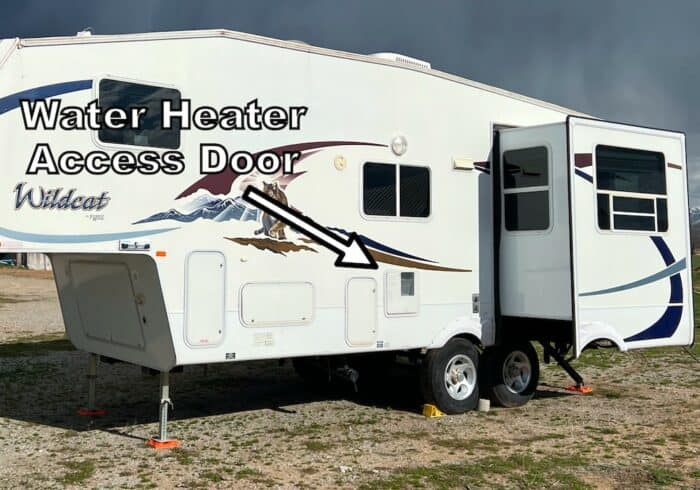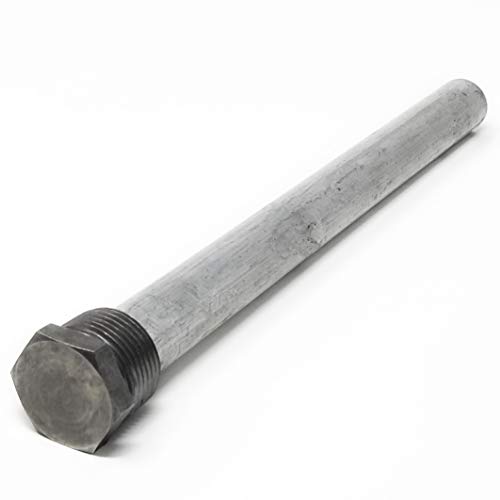What Does an RV Water Heater Anode Rod Do?
There are two main kinds of RV water heaters, one type uses an anode rod and the other does not.
An anode rod, which can be made of aluminum mixed with zinc or magnesium, is used to attract corrosive elements in the water that would otherwise rust and corrode the inside of the tank.
Related Product: Easily remove an RV anode rod with a Camco Anode/Element Wrench (click to view on Amazon)
RV water heaters that use anode rods are typically made of steel with a porcelain lining.
The second kind of RV water heater uses a tank that’s made of aluminum. Aluminum doesn’t corrode in the same way steel does, meaning an anode rod is unnecessary.
This article is for campers with anode rod RV water heaters, usually the Suburban brand.
Atwood Dometics are normally the ones that that made of aluminum. There will be a plastic plug where the anode rod would normally be.
See Also: Best Propane RV Tankless Water Heater Review
If your RV water heaters use an anode rod it will need to be checked regularly.
Anode rods are sacrificial, they are being corroded instead of the inside of the tank. Because of this they eventually disintegrate entirely.
The longevity of the anode rod depends on how often you use your RV water heater, the anode rod material, and the quality of the water.
If the RV water heater anode rod is in need of a replacement you have two choices, magnesium or aluminum.
In this post, I’ll go over the pros and cons of aluminum and magnesium anode rods. I also answer some common questions in the FAQ section at the end.
Aluminum Anode Rod Info
Kelaro RV Aluminum Zinc Anode Rod
Aluminum Zinc Anode Rods
Aluminum Zinc anode rods have long been used in hot water heaters to help prevent corrosion.
Compared to magnesium, aluminum doesn’t attract corrosive minerals as quickly.
That means it’s a longer lasting option, but it’s not as effective and not as good for water with lots of corrosive elements.
One area where aluminum anodes shine is with sulfur rich water that smells like rotten eggs.
Aluminum can react with sulfur to remove it from the water, this gets rid of the rotten egg smell in the water that has been heated.
In hard water that has high pH levels, aluminum anode rods can also be the better choice since it’s not as reactive and hard water doesn’t build up on them as easily.
Aluminum anode rods used to be the more cost effective and popular choice for RV water heaters because of how common aluminum is.
Today, magnesium anode rods have become the preferred choice for RV water heaters. Because of this they have become more budget friendly and easier to find than traditional aluminum anode rods.
See Also: Best RV Shower Heads That Increase Water Pressure
Pros & Cons
PROS
- Removes Rotten Egg Smell (Sulfur)
- Good for Hard Water
- Longer Lasting
CONS
- Works Slower than Magnesium
- Not Good for Water with High Corrosive Element Content
- Harder to Find
- Not as Budget Friendly
Magnesium Anode Rod Info
Oneness RV Magnesium Anode Rod
Magnesium Anode Rods
Magnesium is the most reactive metal used for RV water heater anode rods. That means it attracts corrosive elements and minerals the fastest.
Anode rods made of magnesium are the best at protecting RV water heaters from corrosion but they also have the shortest lifespan and need to be replaced more often.
Hard water is especially difficult for magnesium anode rods to handle. More minerals and higher pH levels in the water corrodes magnesium very quickly.
It can also be coated in limescale to the point where it will stop attracting corrosive elements.
If you are using a magnesium anode rod in extra hard water you will need to replace it more often or get an RV water softener.
Soft water is more corrosive than hard water, an aluminum anode rod can’t work fast enough to remove all of the corrosive elements in soft water.
If you are using an RV water softener or are hooked up to a water source that has soft water you should also be using a magnesium anode rod.
Because of how effective magnesium anode rods are in RV water heaters they have become the more popular choice.
It’s a lot easier to find a magnesium RV anode rod than an aluminum one, because of this they are often more budget friendly.
See Also: Best RV Water Hose For Drinking Water
Pros & Cons
PROS
- Absorbs Corrosive Elements Faster
- Removes Chlorine & Chloramines
- Best for Soft Water
- Budget Friendly
CONS
- Shorter Lifespan
- Not Optimal for Hard Water
What Type of RV Water Heater Anode Rod is Better?
Most prefer magnesium anode rods for their RV water heaters.
The quality of water will change depending on where you are, and since RVs travel all over the place you fill up with hard water one day and softer water the next.
In general, magnesium is the better metal for absorbing corrosive elements. It’s therefore the best option for protecting the inside of an RV water heater.
Yes, you may need to replace it more often than an aluminum anode rod, but it’s still the better choice overall.
Because of the popularity of magnesium RV anode rods, they are a lot easier to find than aluminum ones and are more budget friendly.
Replacing a magnesium RV anode rod twice a year usually won’t cost much more than replacing an aluminum anode rod once a year.
See Also: This Is The Best Heated Water Hose For Long-Term Use
Frequently Asked Questions About RV Water Heater Anode Rods
Where is the anode rod in an RV water heater?
The anode rod can be accessed on the outside of the RV.
If you remove the outer cover of the water heater you will see the burner assembly, vent, and propane line.

RV water heater anode rods use a large bolt on the end that screws into the tank. The hex head will be visible and near the bottom of the tank.
It’s normally below the gas pipes and burner assembly.
The metal hex head on Suburban water heaters will require a 1 1/16 inch socket to remove.
Camco sells dual headed tool (click to view on Amazon) that can be used to remove both the anode rod and water heater elements.
If you have an Atwood RV water heater that doesn’t require an anode rod there will be a plastic bolt with a hex head in the same location an anode rod is on a Suburban water heater.
This plastic plug is used to drain the tank when you want to winterize your RV water heater or when it won’t be used for a while.
The plug must be made of plastic so it doesn’t fuse to the RV tank. You can get extra RV water tank plugs and a tool to remove them here (click to view on Amazon).
How do you know when an RV water heater anode rod needs to be replaced?
Anode rods disintegrate over time. When fully dissolved there will be just a small steel rod left over.
The general guideline is to try and replace the RV anode rod before it’s over 75% disintegrated.
If you remove the anode rod and can see the core it’s probably time for a replacement.
Many RVers replace the RV water heater anode rod yearly no matter what.
They remove the rod in the fall for winterization and replace it with a new one in the spring before the first camping trip.
Does an aluminum RV water heater (Atwood) need an anode rod?
No, Atwood RV water heaters that have aluminum tanks do not need anode rods.
Even though an aluminum Atwood water heater could have an anode rod installed there really aren’t any benefits in doing so.
Using an anode rod in an Atwood water heater can void the warranty.
Have any more questions about aluminum vs magnesium anode rods for RV water heaters? Leave a comment below.



